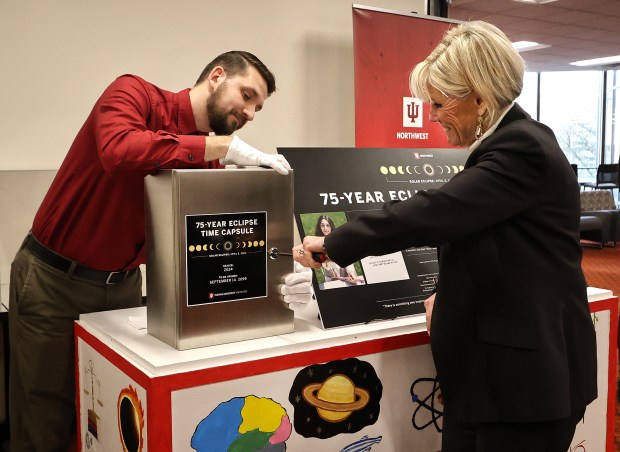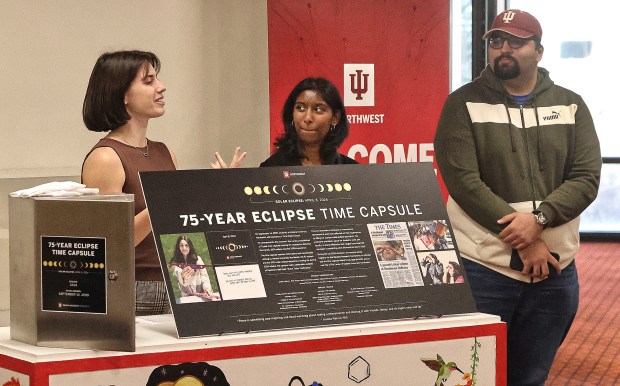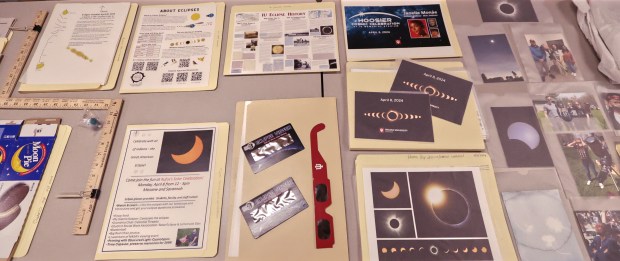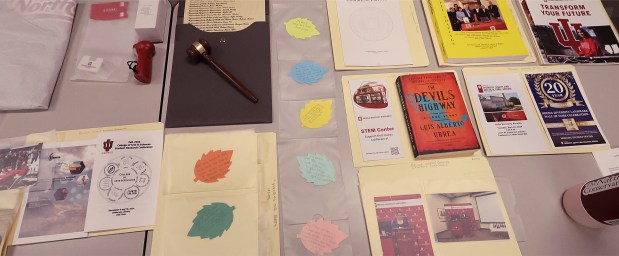Before April 8, the last total solar eclipse to pass over Gary was in 1806. The next will be on Sept. 14, 2099, and Indiana University Northwest officials wanted the future generation to understand the campus culture.
“A time capsule commemorating the eclipse and IUN during 2024 just seemed like a natural fit,” said Jessica Warren, lecturer of physics and astronomy.
University staff, including interim Chancellor Vicki Román-Lagunas, on Monday sealed the university’s time capsule, which had information and memorabilia to IUN and the solar eclipse. Other items included eclipse glasses, an empty box of Moon Pies and photos from the campus’ solar celebration.
The April solar eclipse moved through North America from Mexico, through the U.S. and into Canada, Warren said.
“This eclipse was perhaps one of the most viewed, certainly in North America, perhaps in the world,” Warren said. “Here at IUN, we witnessed a 95% partial eclipse, which was a very significant event.”
Jeremy Pekarek, assistant librarian and archivist, collected the time capsule’s items and prepared it to be sealed. Pekarek used archival folders, photograph sleeves and tissue paper to protect items.

The time capsule was a steel container that could be buried, but the university chose to display it in the campus library.
“We’re going to display it for people to see and look forward to as the years go by,” Pekarek said. “This beautiful container will sit in the (library’s) STEM center and be appreciated. It’s an appropriate place to have something that’s of this scientific nature.”
Savannah Bennett, STEM Center coordinator, said the center is honored to house the time capsule for the next 75 years.
“I want to extend a special thank you to our STEM majors for their incredible creativity and thoughtfulness,” Bennett said.

The time capsule shows how IUN is special, Román-Lagunas said, and she hopes people will still see that in 75 years.
“This event and everything that happened during the eclipse last semester really show that part of our character here,” she said. “We challenge ourselves every day to effectively serve our outstanding and very diverse student body.”
IUN students helped paint the platform holding the time capsule. They decorated it with STEM-themed designs and art dedicated to the campus’ Hispanic heritage.

IUN is the first public regional institution in Indiana to be designated as a Hispanic and minority-serving institution.
Students Haley Weiland, Marian Ameeruddin and Hamza Nasar all helped prepare for the April eclipse, and the three students spoke at the time capsule sealing Monday.
It was interesting to teach people about the eclipse, Nasar said, and watching the time capsule be sealed was a culmination of the university’s work.
“I liked teaching people about the intricacies of the eclipse,” he said, “things they wouldn’t even really think about unless they were in that kind of work.”
Weiland, Ameeruddin and Nasar helped Warren, Pekarek and Bennett read postcards that are included in the time capsule.
“There was some talk about the world ending due to the eclipse,” Bennett read. “It obviously didn’t — yay. For about three hours, I watched the eclipse slowly come to form, and I was blessed to see it from my backyard. Although it wasn’t in the path of totality, it was still an amazing experience.”




